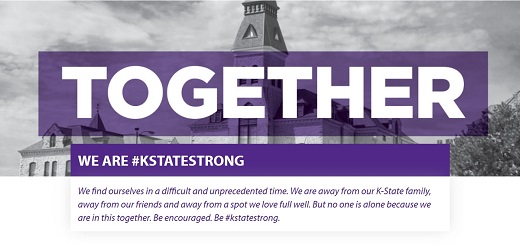07/08/20
K-State Current - July 8, 2020
K-State Current is a weekly news update for the Kansas Board of Regents to apprise the Regents on a few of the many successes and achievements made by K-State faculty, staff and students.
K-State News
Visit K-State’s “We Are #KStateStrong” site to view brief videos designed to keep the K-State family engaged, connected and inspired during these challenging times.
Bulk Solids Innovation Center celebrates five years of operation in Salina
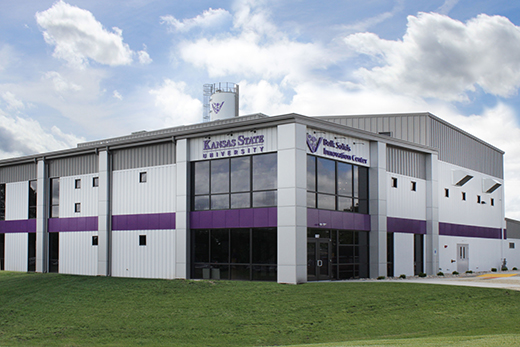 From research to product testing to education and training, the Kansas State University Bulk Solids Innovation Center is celebrating five years of contributions to the particle technology industry.
From research to product testing to education and training, the Kansas State University Bulk Solids Innovation Center is celebrating five years of contributions to the particle technology industry.
The only facility of its kind in North America, the center opened in June 2015 after breaking ground on the project in north Salina less than a year prior. With 13,000-square-feet of laboratories, a testing bay and conference and lecture rooms, the center's mission has been to study the science of bulk solids handling while offering innovative solutions to customers that improve bulk solids storage, flow and conveying.
"Bulk solids make up more than 80% of items transported around the world, yet formal education and research in this area is not completely understood," said Raju Dandu, the facility's director. "This recognition, along with the university's land-grant mission and Salina's history of being a large flour milling hub, propelled the need to create the center. In collaboration with several entities, over the years the bulk solids innovation center has been able to provide value-added solutions and services that enhance efficiency and productivity in a variety of industries as well as contribute to local economic growth and foster education."
The two-story facility has six laboratories for university and industry-sponsored research, a material properties testing laboratory and a full-scale bulk solids test bay. The center has partnered with several companies over the last five years to provide research and consulting services ranging from small scale sample material characterization to full-scale material handling and storage. Most recently, the center teamed up with a global chemical company to supply testing services, including equipment improvements, for one of its more challenging products.
In addition to supporting customers, the Kansas State University Bulk Solids Innovation Center offers professional development courses. In January 2016, the center hosted its first industry short course on bulk solids handling and it exceeded capacity expectations with students from 13 states participating. Since then, nearly 350 people from 42 states and several countries have attended more than 20 classes, and current course topics now include Foundations of Pneumatic Conveying, Advanced Pneumatic Conveying and Storage and Flow of Bulk Solids.
"It has been fun seeing industry's enthusiasm about the bulk solids innovation center and its capabilities," said Todd Smith, business and strategy manager at the facility. "Many companies want to contribute equipment and we are continually being asked to add new methods, courses and testing capacity. Our goal for the center is to become the country's known leader for bulk solids technology — within four years, we want to be the place industry thinks of first."
Since the facility is university-connected, it also provides a space where students at the Kansas State University Polytechnic Campus in Salina can gain hands-on experience and build employable skills while supporting the center's daily functions and its important research. Currently, the center employs three student interns who perform lab tests for customers and assist in project phases, from equipment design and setup all the way through to test execution and data collection and analysis. Additionally, students in the engineering technology programs at K-State Polytechnic often utilize the bulk solids innovation center for their senior design course projects.
Along with Dandu, who also is a professor of mechanical engineering technology at Kansas State Polytechnic, and Smith, the center employs lab manager, Kevin Solofra. His position is new, joining the team in February. Solofra's professional experience ranges from research engineering with product scale-up through process and production management.
The establishment of the Kansas State University Bulk Solids Innovation Center was a partnership between the Salina Area Chamber of Commerce, Salina Economic Development Corporation, U.S. Department of Commerce Economic Development Administration, the state of Kansas and city of Salina. In addition, many industry partners have donated equipment, services, and instruction. For more information on the center's research capabilities or educational courses, contact the bulk solids innovation center at bsic@k-state.edu.
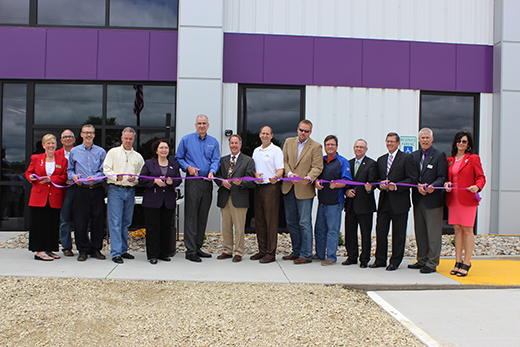
Officials from K-State Polytechnic, the Salina Area Chamber of Commerce and the city of Salina cut the ribbon on the Kansas State University Bulk Solids Innovation Center on May 14, 2015.
U.S. Department of Energy to fund joint project between Manhattan tech company and K-State mechanical and nuclear engineering department
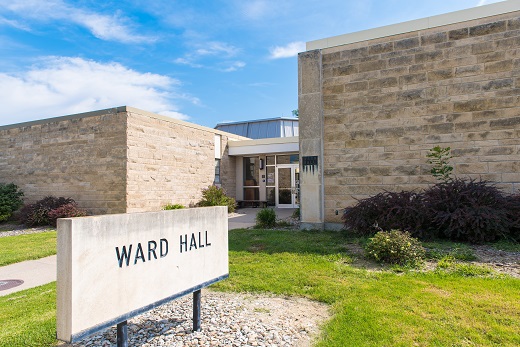 A team from the Alan Levin Department of Mechanical and Nuclear Engineering has been awarded a subcontract as part of a nearly $1 million, two-year U.S. Department of Energy grant to Radiation Detection Technologies Inc.
A team from the Alan Levin Department of Mechanical and Nuclear Engineering has been awarded a subcontract as part of a nearly $1 million, two-year U.S. Department of Energy grant to Radiation Detection Technologies Inc.
The Kansas State University team will be led by Amir Bahadori, assistant professor of mechanical and nuclear engineering, along with co-investigators Walter McNeil, assistant professor, and Douglas McGregor, university distinguished professor, both also from that department.
For the first year of the project, Kansas State University will receive $252,238 from the Department of Energy for work on "X-DSMSND: A Dual-Sided Microstructured Semiconductor Neutron Detector with Integrated Pixel Read-Out." Second-year funding will be based on the team's progress as determined by the federal energy department.
The remainder of the award will go to Radiation Detection Technologies Inc. in Manhattan, where principal investigator will be Steven Bellinger, CEO of the company.
Radiation Detection Technologies Inc. was founded in 2011 out of the Kansas State University SMART Lab in the mechanical and nuclear engineering department. The company focuses on manufacturing quality radiation detectors and detector readout-electronic technologies for use in multiple industries including healthcare, defense and energy.
This award is part of DOE's Small Business Technology Transfer program that supports scientific excellence and technological innovation through the investment of federal research funds in critical American priorities to build a strong national economy.
K-State Faculty Highlights
Martin Seay named to InvestmentNews' 40 Under 40 list
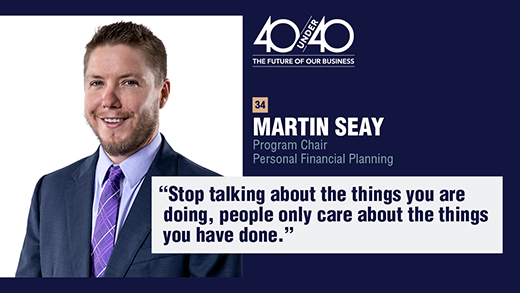 The head of the new personal financial planning department at Kansas State University is being nationally recognized as a rising star in the field.
The head of the new personal financial planning department at Kansas State University is being nationally recognized as a rising star in the field.
Martin Seay, associate professor of personal financial planning and certified financial planner, has been named to the 40 Under 40 list for 2020 by InvestmentNews, the investing news source for financial advisors. The list was created to recognize young talent in the industry.
Seay was chosen from a pool of about 1,000 nominees by a panel of reporters, editors and other representatives of InvestmentNews.
"I am honored by this recognition from InvestmentNews, which is testament to the support and resources that Kansas State University and the College for Health and Human Sciences have provided to the personal financial planning program and faculty," Seay said.
With approval from the Kansas Board of Regents, K-State's personal financial planning program became a department in the College of Health and Human Sciences at the start of the new fiscal year, with Seay selected as its first department leader. A K-State faculty member since 2012, Seay teaches both undergraduate and graduate students. His research focuses on borrowing decisions, how psychological characteristics shape financial behavior, and methodology in financial planning research. His work has been published in the Journal of Behavioral Finance, Journal of Financial Counseling and Planning, Financial Services Review, Journal of Consumer Affairs, Journal of Financial Services Professionals, Journal of Financial Planning and Journal of Financial Therapy among others.
For his work, Seay has been recognized with the 2014, 2017 and 2019 Best Applied Research Paper Award at the annual conference of the Financial Planners Association; the 2016 CFP Board of Standards' ACCI Financial Planning Award; and the 2016 Montgomery-Warschauer Award, which is awarded by the Journal of Financial Planning for the paper that provided the most outstanding contribution to the betterment of the profession in the previous year. Seay also was awarded the Kenneth Tremblay Early Career Housing Award from the Housing Education and Research Association in 2016.
Seay currently serves as president for the Financial Planning Association, the largest membership organization for certified financial planning professionals in the country. The organization also includes many others who support the financial planning process. Seay serves on the editorial review board for the Journal of Financial Planning and the Journal of Financial Therapy and as a director for the Academy of Financial Services.
Seay received his doctorate in housing and consumer economics with an emphasis in family financial planning from the University of Georgia.
"The 2020 class of 40 Under 40 honorees represent the best of the future of the financial advice community," said George B. Moriarty, chief content officer of InvestmentNews. "These men and women have already made their marks on the industry through exceptional leadership and service to their communities."
Seay and others making the 2020 40 Under 40 list are highlighted in the June 29 issue of InvestmentNews and online at investmentnews.com.
Heinrich named president-elect for American Academy of Health Behavior
 Katie Heinrich, professor in kinesiology, has been named president-elect for the American Academy of Health Behavior. The mission of the American Academy of Health Behavior™ is to serve as the “research home” for health behavior scholars committed to excellence and diversity in research to improve the public's health. She will serve as the 21st president for the Academy in 2021-22, and is the first faculty member from K-State to serve in the role.
Katie Heinrich, professor in kinesiology, has been named president-elect for the American Academy of Health Behavior. The mission of the American Academy of Health Behavior™ is to serve as the “research home” for health behavior scholars committed to excellence and diversity in research to improve the public's health. She will serve as the 21st president for the Academy in 2021-22, and is the first faculty member from K-State to serve in the role.
Heinrich has provided extensive service to the Academy including serving as the Research Review Chair for the 2013 annual meeting, a poster judge, an awards council member since 2014, a member of three different ad hoc journal committees, and she has served on the Academy’s board of directors since 2014, holding the position of Chair of the Marketing andCommunications Council as well as Member Delegate. She has mentored two junior faculty members through the Academy’s Professional Development Research Scholars program, resulting in multiple peer-reviewed publications and external grant submissions. Heinrich is also a Fellow of the Academy in recognition of her external research funding of over $3.4 million, and over 50 data-based peer-reviewed publications.
An accomplished educator and researcher, Heinrich received a college Excellence in Research Award in 2018 and was recognized as Outstanding Graduate Faculty in 2019. She is the director of the Functional Intensity Training Laboratory (http://bit.ly/fitlab), providing mentoring in applied exercise behavior and obesity research. The FIT Lab also promotes education and service by providing opportunities for students, faculty, staff and community members toparticipate in exercise training through K-State CrossFit. Heinrich is recognized nationally and internationally for her research on high intensity functional training (HIFT), exercise and chronic disease, and the built environment. Her research aims are to study the effects of HIFT on fitness, health and psychosocial outcomes delivered in a group-based context. She focuses on populations across the lifespan including youth, active duty military, healthy adults, overweight/obese adults, and cancer survivors.
The Academy is based on the belief that the future growth and evolution of the health behavior research rests on a strong commitment to conducting and disseminating quality research. With a critical eye toward the future, four stewards forged a new course for the field built on a distinctive set of conceptual underpinnings: A perceived need to establish a meritocracy that acknowledges the competitive nature of the research environment, challenges members to produce quality research, and recognizes outstanding research contributions; to advance evidence-based practice that is produced from practice-based evidence; the need to mentor new health behavior researchers; the desire to overcome partisan, protective agendas of traditional disciplines by stimulating multi-disciplinary research and learning; the Academy informs and educates scholars about the latest in research innovations and focuses on quality research through its professional meetings and publications.
The Academy was founded April 1, 1997 to transform the health promotion and health education field from a teaching- and service-centered profession to one with a stronger research foundation in which discovery would be valued as a means of improving practice and enhancing public health. The origination of the Academy was based on the belief that the future growth and evolution of the health promotion and health education fields rested on a strong commitment to conducting and disseminating quality research.
K-State Student News
Sales program at Kansas State University named top program for the ninth year in a row
 The National Strategic Selling Institute, known as NSSI, was recently recognized by the Sales Education Foundation, or SEF, magazine as a top program for sales education for the ninth year in a row. To be considered for this honor, the program must offer a minimum of three sales-specific courses, receive accreditation from an external source and have university recognition of the program.
The National Strategic Selling Institute, known as NSSI, was recently recognized by the Sales Education Foundation, or SEF, magazine as a top program for sales education for the ninth year in a row. To be considered for this honor, the program must offer a minimum of three sales-specific courses, receive accreditation from an external source and have university recognition of the program.
"We are honored to once again be recognized by the Sales Education Foundation as a top university for sales," said Dawn Deeter, director of the National Strategic Selling Institute. "Companies are eager to hire graduates of university sales programs because these students achieve success faster and are better-prepared for the sales role. This recognition from the SEF provides our students with even more opportunities."
The NSSI has 180 students enrolled in the certificate in professional strategic selling and 60 students enrolled in the major for professional strategic selling. The program has continued to grow since its inception in 2011 and currently has a 25% yearly growth rate. Students in the program are invited to a variety of sales-related activities throughout the year, including the Fall and Spring Sales weeks where they can participate in keynote speaker events, guest speaker discussion panels and attend a sales career fair where companies are looking to fill internships and full-time positions.
The program has partnered with more than 25 companies to provide students with professional development events and networking opportunities to help prepare them for a career in sales. They also host an annual benefit auction where students raise money for student merit awards and get hands-on experience with prospecting, managing a sales funnel, and learning how to use a customer relationship management system. The award-winning K-State Sales Team participates in various competitions across the country. These sales competitions allow students to broaden their skills outside of the classroom while competing against other universities' sales students.
The National Strategic Selling Institute, housed in the College of Business Administration, is also a full member of the prestigious University Sales Center Alliance. For more information on the National Strategic Selling Institute or their events, please contact kstatesalesprogram@k-state.edu.
